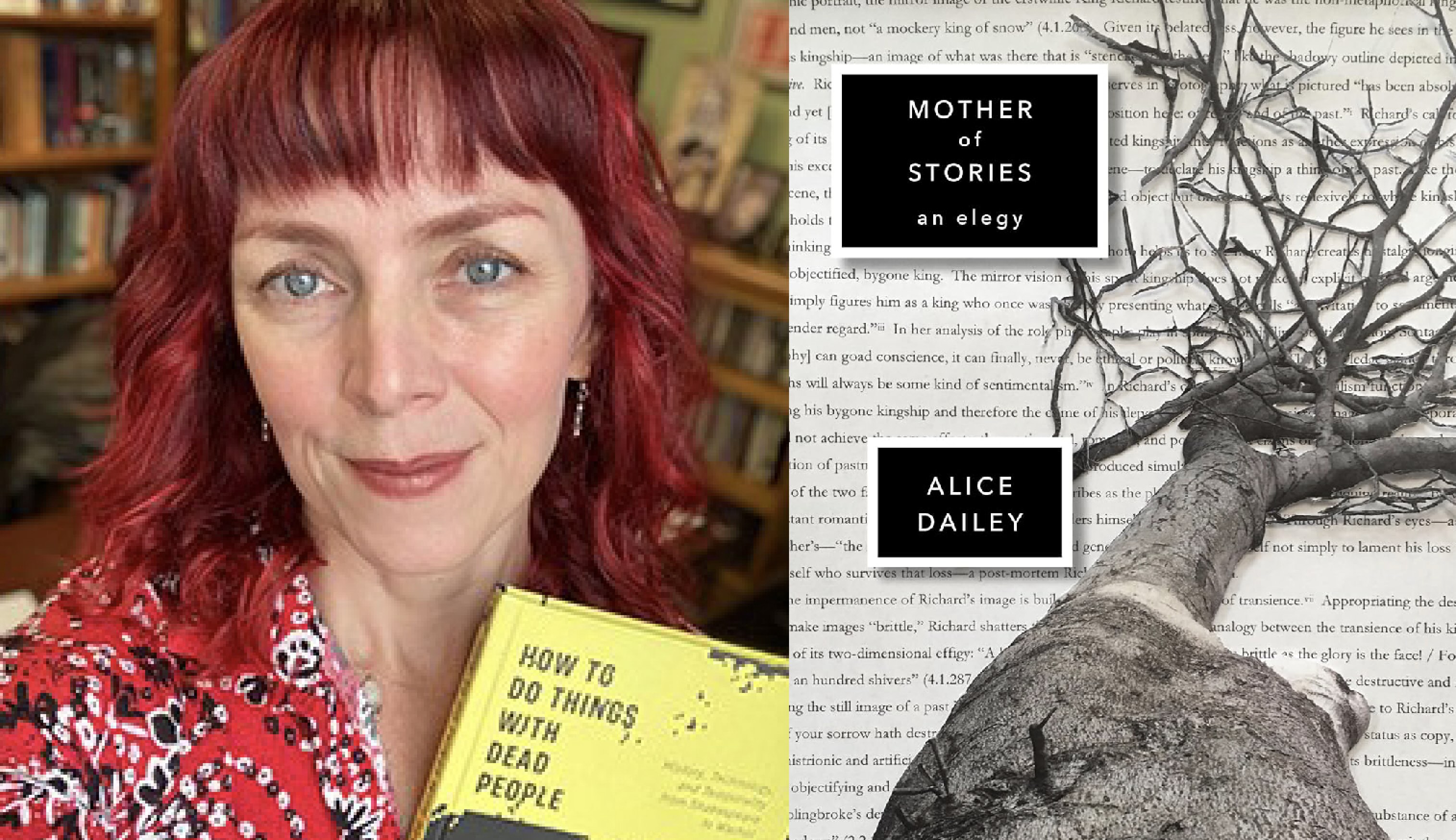Alice Dailey, author of Mother of Stories, discusses personal and academic varieties of death
Robert Carson, Associate Director, Tanner Humanities Center
October 1, 2024

The first Tanner Conversation of 2024-2025 was held on September 25 with Alice Dailey, Professor of English and Director of Faculty Affairs at Villanova University. The subject of conversation was her book, Mother of Stories: An Elegy, published this year by Fordham University Press.
In a blend of memoir and scholarly investigation, Dailey recounts the life and death of her mother, who was “a gifted teacher, a passionate reader, and a pathological liar.” The book reflects on what it means to remember, assemble, and narrate a life full of truth and falsehood. Lindsey Drager (Department of English) who hosted the conversation, introduced Mother of Stories as an “emotionally resonant investigation of the power seeing the world askew, through an oblique angle, refracted, so that the binary between reality and artifice is obscured.” Dailey’s memoir is interwoven with excerpts of her scholarly works about death, Renaissance drama, letters, emails, photographs, and poems. A series of events before and after her mother’s death are full of coincidences, false starts, uncanny repetitions, and provocatively symbolic dreams.
In conversation with Drager, Dailey discussed the book’s synthesis of personal and professional identities. The first impetus to write what would become Mother of Stories was the coincidence of the death of her mother and the completion of her scholarly book, How to Do Things with Dead People: History, Technology, and Temporality from Shakespeare to Warhol (Cornell University Press, 2024). Compelled to examine her simultaneous experiences of daughter, mother, and scholar, Dailey also faced the task of narrating her mother’s pervasive and often hurtful pattern of deceit.
Mother of Stories draws on Dailey’s scholarly expertise in literary representations of death and dying in early modern English drama. One such point of resonance is the term martyr. Her mother often resorted to making a “martyr” of herself by recounting, often fictitiously, her life’s history of victimhood. However, the term martyr did not originally connote death or suffering, but witnessing, as in, the martyr bears witness to their knowledge. (Dailey discusses this in her book, The English Martyr from Reformation to Revolution, University of Notre Dame Press, 2012.) This etymological fact complicates both her mother’s self-victimhood through falsehood, and Dailey’s own task of witnessing death in both her family and scholarship.
Dailey also considers the role of death in the material she teaches, from Shakespearean tragedy replete with murder and death, to 20th-century poetry, including Gabrielle Calvocoressi’s “Fire Circus” poems, about the death of children in a gruesome fire. Drager drew attention to a passage of the memoir, in which Dailey recalls the question of Why assign such morbid readings? The text answers, “we read tragedy because it cultivates empathy—that consciousness of human suffering makes us more human. We read sad books because sadness is part of being alive.” While this answer is true, Dailey also recognizes the potential weakness of it, writing “it isn’t much,” reflecting her own strain while coping with the fact of death in real life.
The question-and-answer period solicited Dailey’s views on therapy, both in her memoir, and the therapeutic work of writing the memoir itself. Additionally, she considered the pull of narratives that persist even after a person dies, and the ways in which even after death, there is a persistent desire to make coherent meaning.
Mother of Stories is both a literary memoir about death, and a consideration of the nature of death in literature. In this way, it belongs to the genre of autotheory, in which theoretical insight remains bound up with the experiences that give rise to it. (Other examples of autotheory include Maggie Nelson’s The Argonauts and Saidiya Hartman’s Lose Your Mother: A Journey Along the Atlantic Slave Route.) With origins in late 20th-century feminism, autotheory expresses the first-person nature of knowledge and thought, rather than insisting on scholarly distance between the author and their subject.
As part of her visit, Dailey also led a workshop in the Department of English: “Making (Weird, Impractical, Interdisciplinary) Dreams Come True: Villanova’s Spanish Tragedy Project.” Thomas Kyd’s Spanish Tragedy features in Mother of Stories and is an intertext in William Shakespeare’s Hamlet.
